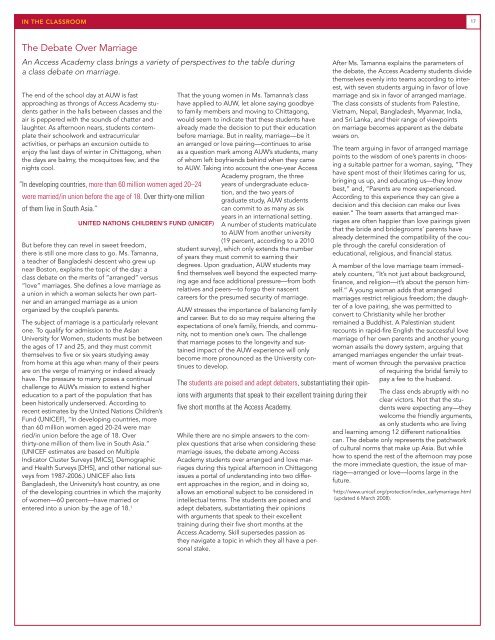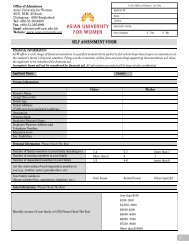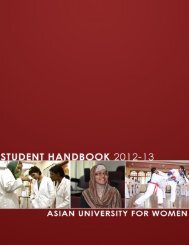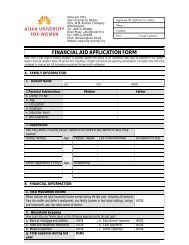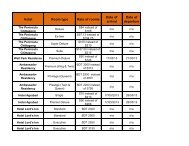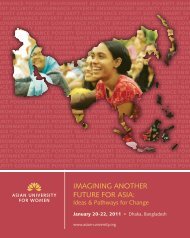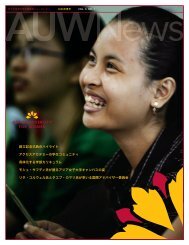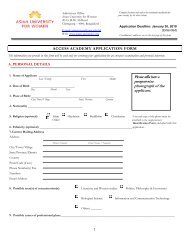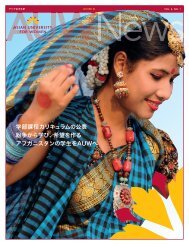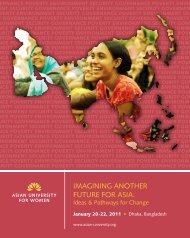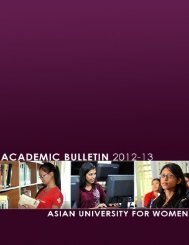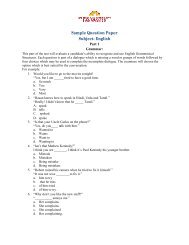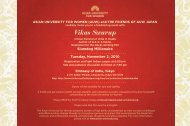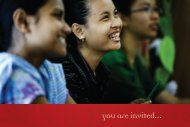Fall 2010 - Asian University for Women
Fall 2010 - Asian University for Women
Fall 2010 - Asian University for Women
Create successful ePaper yourself
Turn your PDF publications into a flip-book with our unique Google optimized e-Paper software.
IN THE CLASSROOM 17<br />
The Debate Over Marriage<br />
An Access Academy class brings a variety of perspectives to the table during<br />
a class debate on marriage.<br />
The end of the school day at AUW is fast<br />
approaching as throngs of Access Academy students<br />
gather in the halls between classes and the<br />
air is peppered with the sounds of chatter and<br />
laughter. As afternoon nears, students contemplate<br />
their schoolwork and extracurricular<br />
activities, or perhaps an excursion outside to<br />
enjoy the last days of winter in Chittagong, when<br />
the days are balmy, the mosquitoes few, and the<br />
nights cool.<br />
“In developing countries, more than 60 million women aged 20–24<br />
were married/in union be<strong>for</strong>e the age of 18. Over thirty-one million<br />
of them live in South Asia.”<br />
UNITED NATIONS CHILDREN’S FUND (UNICEF)<br />
But be<strong>for</strong>e they can revel in sweet freedom,<br />
there is still one more class to go. Ms. Tamanna,<br />
a teacher of Bangladeshi descent who grew up<br />
near Boston, explains the topic of the day: a<br />
class debate on the merits of “arranged” versus<br />
“love” marriages. She defines a love marriage as<br />
a union in which a woman selects her own partner<br />
and an arranged marriage as a union<br />
organized by the couple’s parents.<br />
The subject of marriage is a particularly relevant<br />
one. To qualify <strong>for</strong> admission to the <strong>Asian</strong><br />
<strong>University</strong> <strong>for</strong> <strong>Women</strong>, students must be between<br />
the ages of 17 and 25, and they must commit<br />
themselves to five or six years studying away<br />
from home at this age when many of their peers<br />
are on the verge of marrying or indeed already<br />
have. The pressure to marry poses a continual<br />
challenge to AUW’s mission to extend higher<br />
education to a part of the population that has<br />
been historically underserved. According to<br />
recent estimates by the United Nations Children’s<br />
Fund (UNICEF), “In developing countries, more<br />
than 60 million women aged 20-24 were married/in<br />
union be<strong>for</strong>e the age of 18. Over<br />
thirty-one million of them live in South Asia.”<br />
(UNICEF estimates are based on Multiple<br />
Indicator Cluster Surveys [MICS], Demographic<br />
and Health Surveys [DHS], and other national surveys<br />
from 1987-2006.) UNICEF also lists<br />
Bangladesh, the <strong>University</strong>’s host country, as one<br />
of the developing countries in which the majority<br />
of women—60 percent—have married or<br />
entered into a union by the age of 18. 1<br />
That the young women in Ms. Tamanna’s class<br />
have applied to AUW, let alone saying goodbye<br />
to family members and moving to Chittagong,<br />
would seem to indicate that these students have<br />
already made the decision to put their education<br />
be<strong>for</strong>e marriage. But in reality, marriage—be it<br />
an arranged or love pairing—continues to arise<br />
as a question mark among AUW’s students, many<br />
of whom left boyfriends behind when they came<br />
to AUW. Taking into account the one-year Access<br />
Academy program, the three<br />
years of undergraduate education,<br />
and the two years of<br />
graduate study, AUW students<br />
can commit to as many as six<br />
years in an international setting.<br />
A number of students matriculate<br />
to AUW from another university<br />
(19 percent, according to a <strong>2010</strong><br />
student survey), which only extends the number<br />
of years they must commit to earning their<br />
degrees. Upon graduation, AUW students may<br />
find themselves well beyond the expected marrying<br />
age and face additional pressure—from both<br />
relatives and peers—to <strong>for</strong>go their nascent<br />
careers <strong>for</strong> the presumed security of marriage.<br />
AUW stresses the importance of balancing family<br />
and career. But to do so may require altering the<br />
expectations of one’s family, friends, and community,<br />
not to mention one’s own. The challenge<br />
that marriage poses to the longevity and sustained<br />
impact of the AUW experience will only<br />
become more pronounced as the <strong>University</strong> continues<br />
to develop.<br />
The students are poised and adept debaters, substantiating their opinions<br />
with arguments that speak to their excellent training during their<br />
five short months at the Access Academy.<br />
While there are no simple answers to the complex<br />
questions that arise when considering these<br />
marriage issues, the debate among Access<br />
Academy students over arranged and love marriages<br />
during this typical afternoon in Chittagong<br />
issues a portal of understanding into two different<br />
approaches in the region, and in doing so,<br />
allows an emotional subject to be considered in<br />
intellectual terms. The students are poised and<br />
adept debaters, substantiating their opinions<br />
with arguments that speak to their excellent<br />
training during their five short months at the<br />
Access Academy. Skill supersedes passion as<br />
they navigate a topic in which they all have a personal<br />
stake.<br />
After Ms. Tamanna explains the parameters of<br />
the debate, the Access Academy students divide<br />
themselves evenly into teams according to interest,<br />
with seven students arguing in favor of love<br />
marriage and six in favor of arranged marriage.<br />
The class consists of students from Palestine,<br />
Vietnam, Nepal, Bangladesh, Myanmar, India,<br />
and Sri Lanka, and their range of viewpoints<br />
on marriage becomes apparent as the debate<br />
wears on.<br />
The team arguing in favor of arranged marriage<br />
points to the wisdom of one’s parents in choosing<br />
a suitable partner <strong>for</strong> a woman, saying, “They<br />
have spent most of their lifetimes caring <strong>for</strong> us,<br />
bringing us up, and educating us—they know<br />
best,” and, “Parents are more experienced.<br />
According to this experience they can give a<br />
decision and this decision can make our lives<br />
easier.” The team asserts that arranged marriages<br />
are often happier than love pairings given<br />
that the bride and bridegrooms’ parents have<br />
already determined the compatibility of the couple<br />
through the careful consideration of<br />
educational, religious, and financial status.<br />
A member of the love marriage team immediately<br />
counters, “It’s not just about background,<br />
finance, and religion—it’s about the person himself.”<br />
A young woman adds that arranged<br />
marriages restrict religious freedom; the daughter<br />
of a love pairing, she was permitted to<br />
convert to Christianity while her brother<br />
remained a Buddhist. A Palestinian student<br />
recounts in rapid-fire English the successful love<br />
marriage of her own parents and another young<br />
woman assails the dowry system, arguing that<br />
arranged marriages engender the unfair treatment<br />
of women through the pervasive practice<br />
of requiring the bridal family to<br />
pay a fee to the husband.<br />
The class ends abruptly with no<br />
clear victors. Not that the students<br />
were expecting any—they<br />
welcome the friendly arguments,<br />
as only students who are living<br />
and learning among 12 different nationalities<br />
can. The debate only represents the patchwork<br />
of cultural norms that make up Asia. But while<br />
how to spend the rest of the afternoon may pose<br />
the more immediate question, the issue of marriage—arranged<br />
or love—looms large in the<br />
future.<br />
1<br />
http://www.unicef.org/protection/index_earlymarriage.html<br />
(updated 6 March 2008).


